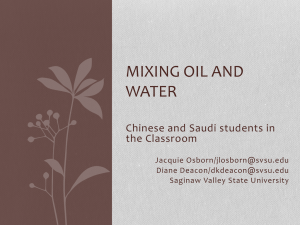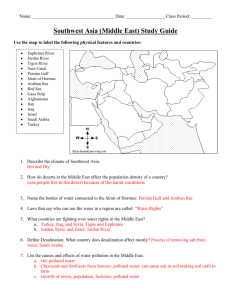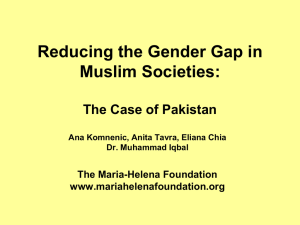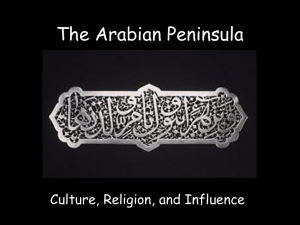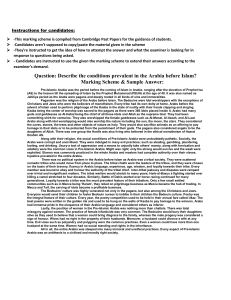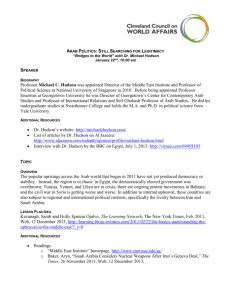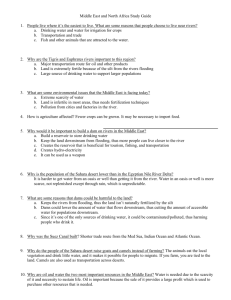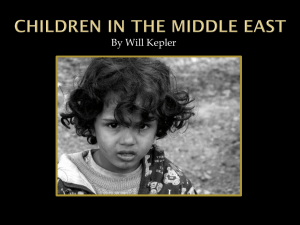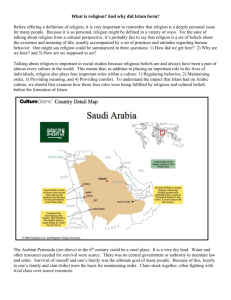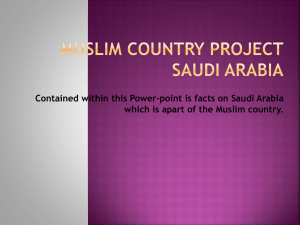Saudi Arabia A to Z
advertisement
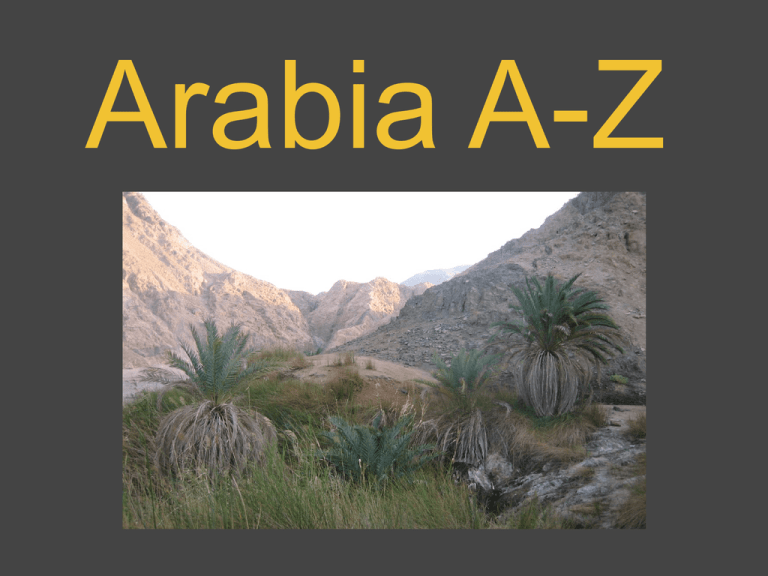
Arabia A-Z Arabia A-Z Algebra A+B=C Arabs presented the first systematic solution to linear and quadratic equations. Bedouin Nomadic tribesmen have inhabited the deserts of Saudi Arabia for thousands of years. Camel This one-humped dromedary was domesticated thousands of years ago as a pack animal. Dates One of the healthiest natural foods you can eat. They are loaded with vitamins and minerals, high in fiber, and taste like honey. Equestrian Bedouins tell a story of Allah creating the Arabian horse from the four winds; spirit from the North, strength from the South, speed from the East, and intelligence from the West. Five Pillars of Islam The Muslim faith requires Muslims to: Shahada Accept that there is no god but God, and Muhammad is the messenger of God. Salat Pray five times a day: 1. Fajr at dawn 2. Dhuhr at noon 3. Asr in the afternoon 4. Maghrib at sunset 5. Isha'a in the evening Sawm Fast for the month of Ramadan. Zakat Give to the poor, alms-giving. Hajj Make a pilgrimage to Mecca, Islam's holiest city, at least once in a lifetime. Geography Arab geographers develop sophisticated maps and charts used by famous explorers. Healing Arts Arab physicians lay the foundations of modern medicine. Incense At one time Frankincense from Arabia was more valuable than gold. Jeddah The commercial heart of modern day Saudi Arabia plays a critical role in the world economy. Ka'bah The Ka'bah is the most sacred site in Islam believed to be the original spot where Abraham along with his son Ishmael raised the foundations of the holy house. Legends Some of the best known Arab legends include "Aladdin", "Ali Baba and the Forty Thieves", and "The Seven Voyages of Sinbad the Sailor." Legends Some of the best known Arab legends include "Aladdin", "Ali Baba and the Forty Thieves", and "The Seven Voyages of Sinbad the Sailor." Muhammad The founder of the religion of Islam and believed by Muslims to be a messenger and prophet of God. Muhammad The founder of the religion of Islam and believed by Muslims to be a messenger and prophet of God. Numerals Arabic numerals are the ten digit numeral system used today: 0, 1, 2, 3, 4, 5, 6, 7, 8, 9 Oil In 1938, the largest reserve of crude oil was discovered in Saudi Arabia. Today, Saudi Aramco is the largest producer of crude oil and natural gas in the world. Preservation Much of our knowledge of histories greatest philosophers, historians, and scientists comes from the preservation of historical writings in sophisticated libraries developed by the Arabs. Qur'an The religious text of Islam and believed to be the divine guidance of God as revealed to Muhammad by the Angel Gabriel. R'ub al Khali One of the largest sand deserts in the world stretching across the southern third of the Arabian Peninsula, also known as the Empty Quarter. Saud Abdul Aziz ibn Saud: visionary, warrior, and founding father. A man who imposed his will on the Arabian peninsula to transform Saudi Arabia into a global power. Trade Routes Caravans of traders transported the bulk of spice, incense and luxury goods through Arabia, the crossroads between Africa, Asia, and Europe. Ululation A long, high-pitched note made with a rapid vibration of the tongue commonly used by Middle Eastern women to express great joy at weddings or sadness at death. Veil The wearing of a veil, black abaya, or other modest covering when in public is part of Arab cultural dress for women. Water Works Arabs mastered the art of manipulating water for use in the desert developing water wheels, water towers, and water wells. Xenophon In the 4th century, he wrote one of the most widely read descriptions of greater Arabia, Anabasis. Yathrib Yathrib renamed Medina is the second holiest city in Islam and the burial place of Islamic Prophet Muhammad. Zero The Arab introduction of the number zero revolutionized mathematics.

